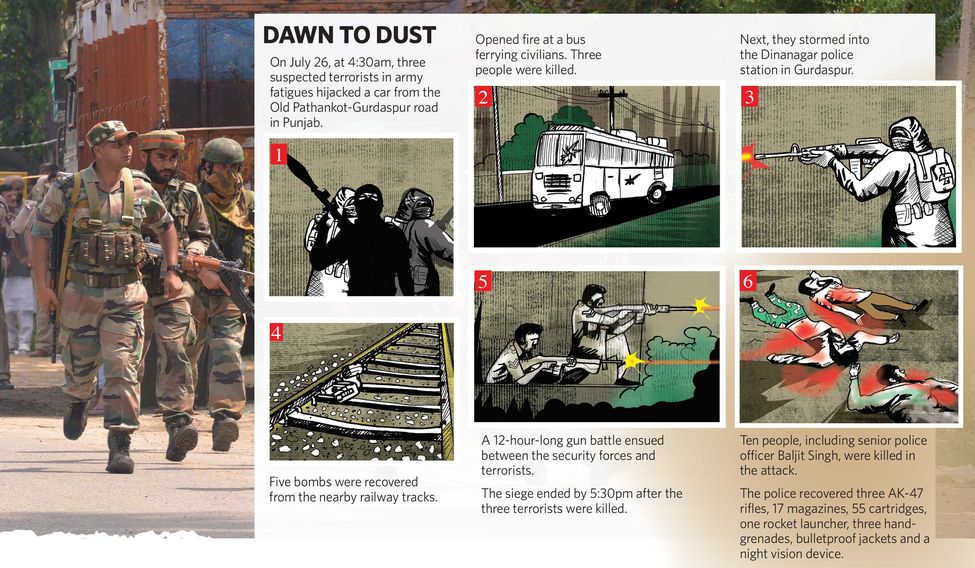It was like a scene straight out of an action film. On July 26, when three suspected terrorists stormed into the Dinanagar police station in Gurdaspur in Punjab, the first thing on everyone's mind was to secure the safety of the civilians in the area.
Once inside, the terrorists started firing and moved to the adjoining police barracks. That is when a police officer spotted two children inside a building barely ten metres from the barracks.
The children were not fully aware of the danger they were in. When the officer approached them through one of the windows, they were laughing. The officer reprimanded them and asked them if there were any more people inside the building. The children told him it was just the two of them. The officer quickly brought them to safety.
Terrorism is not new to Punjab, which was once plagued by the Khalistan movement. However, post the defeat of the pro-Khalistan militant groups in 1993, Punjab did not witness any major terror incidents. So, when the latest attack happened, everyone was shocked. But the police quickly swung into action.
“Knowing well the methods adopted by the Army and the National Security Guard in such situations, it was decided to bring on the Punjab Police's Special Weapons and Tactics team, which was formed four years ago with the help of Israeli security agencies,” said a senior police officer.
Dinanagar station house officer Mukhtiar Singh held the fort till help arrived. Soon, superintendent of police (detective) Baljit Singh joined him and took charge of the operation. “The terrorists were heavily armed with AK-47s and rocket launchers of Chinese make. They were using bullets that could pierce a vehicle,” said Ishwar Chandra Sharma, inspector general of police, border zone, who commanded the SWAT team when it arrived at the scene.
By then Baljit Singh had shot down one terrorist. “He had taken position on the fifth floor of a nearby eye hospital and was firing from there, which was an advantageous position as it was about five metres above the target [the building where the terrorists were holed up],” said Sharma.
During the firing, Baljit Singh was hit by a bullet on the forehead and he fell dead. It became clear that the siege could go on for hours. So, why was the Army and the NSG not pressed into service? “In this operation, we did not require the help of the Army,” said Director General of Police Sumedh Singh Saini. “The operation was carried out by the Punjab Police officers and jawans.”
The Punjab Police had faith in the SWAT commandos. “The Punjab Police officers have seen such situations and on many occasions dealt with them. We are capable enough,” said Sharma. “Once the operation was over, we called the Army to defuse the bombs and other ammunition left behind by the terrorists.”
Another police officer, however, said the Army did more than just diffusing bombs. “After Baljit Singh’s death, a small unit of the Army stationed itself atop a five-storey building, which helped immensely in the operation, as it provided cover firing to the SWAT commandos,” said the officer.
This was the SWAT team's first-ever anti-terrorism operation since its inception in 2011. And, it did quite well as none of its commandos were injured or killed. The unit consists of about 80 highly trained elite commandos who have lethal weapons and know how to strike with precision.
Luck also played a role in the success of the operation. When the terrorists struck, 28 SWAT commandos were attending a training camp organised jointly with the NSG in Amritsar, 80km away from Dinanagar. They were carrying only light weapons, but they rushed to the spot to take control of the situation. Later, heavy weaponry was sent to them from Chandigarh.
“We are trained to engage in battle in any condition,” said a commando. “It is not that we do not have bulletproof jackets and helmets. But since the situation demanded, we launched the operation with whatever little we had.”
Initially, there were reports that the gun battle was prolonged in the hope of catching at least one of the terrorists alive. The police, however, denied it. “The gun battle was so fierce that it was impossible to catch them alive,” said Sharma. “It was clear that they had no plans to surrender because they fired nonstop till the very end. Basically, they were suicide attackers. Had we tried to catch them alive, we would have lost more officers.” Apart from Baljit Singh, the Punjab Police lost three other officers.
In New Delhi, Home Minister Rajnath Singh held a high-level meeting with senior security and intelligence officers. He spoke to Punjab Chief Minister Parkash Singh Badal and assured him help from the Centre.
There is speculation that the terrorists belonged to Lashkar-e-Taiba and had the backing of Pakistan’s Inter-Services Intelligence. “Guarding the border is not the responsibility of the state government,” said Badal. “It is for sure that they had come from across the border. We need to plug the holes along the border with Pakistan.”
The Centre, meanwhile, has asked the states to beef up security. “There are specific intelligence inputs suggesting that at least two more such groups are waiting on the border to cross over from Pakistan,” said a senior home ministry officer.
But why did they strike in Punjab? “We have credible intelligence input that the ISI is making serious efforts to revive militancy in Punjab,” said a home ministry officer.
Sources said following an interrogation of two Sikh militants, Jagtar Singh Tara and Harminder Singh alias Mintoo, who were arrested recently after being extradited from Thailand, it was revealed that the ISI was putting pressure on them to revive militancy in the state. The incident, however, is unlikely to derail the scheduled talks between National Security Adviser Ajit Doval and his Pakistani counterpart Sartaj Aziz.







